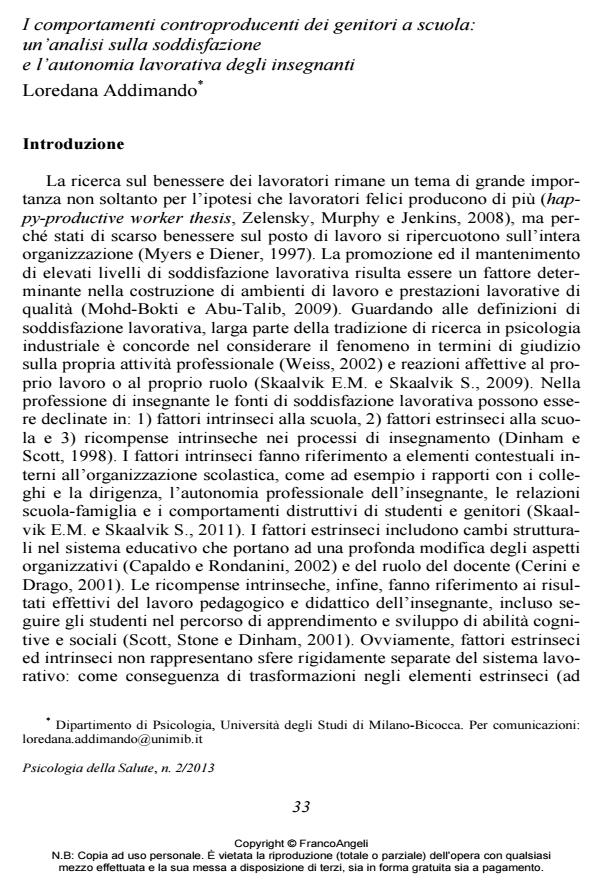Parents’ counterproductive behaviors at school: an analysis of teachers’ job satisfaction and autonomy
Journal title PSICOLOGIA DELLA SALUTE
Author/s Loredana Addimando
Publishing Year 2013 Issue 2013/2
Language Italian Pages 19 P. 33-51 File size 373 KB
DOI 10.3280/PDS2013-002004
DOI is like a bar code for intellectual property: to have more infomation
click here
Below, you can see the article first page
If you want to buy this article in PDF format, you can do it, following the instructions to buy download credits

FrancoAngeli is member of Publishers International Linking Association, Inc (PILA), a not-for-profit association which run the CrossRef service enabling links to and from online scholarly content.
Job satisfaction is a substantial topic in our daily lives. Kahneman and Krueger suggested that it is a strong predictor of general subjective well-being. Furthermore, teachers’ job satisfaction is an important protective factor from on job stress and it is able to mitigate situations of teachers’ distress managing parents’ counterproductive behaviors at school. As a matter of fact, the continual exposure to parents’ counterproductive behaviors can deplete teachers’ emotional and physical resources, reducing the levels of job satisfaction. The present study explores the relationship among teachers’ job satisfaction, parents’ counterproductive behaviors and other organizational and personal variables in a sample of primary and secondary teachers (N = 1025) of Lombardy region (Italy). Discriminant Analysis was conducted by using the job satisfaction variable. The results show that the discriminant function predicts 76.9% of cases in groups Uncooperative and uninvolved behaviors seem to characterize the unsatisfied group, while overprotective dimension does not contribute significantly to the discriminant function. The implications of the study are discussed in the light of empirical research on effects of teacher training courses. Specifically, in order to increase teachers’ job satisfaction it seems to be useful to concentrate organizational efforts on involving parents showing low level of cooperation. Keywords: teachers’ job satisfaction, counterproductive behaviors, parental involvement, discriminant analysis. Uncooperative and uninvolved behaviors seem to characterize the unsatisfied group, while overprotective dimension does not contribute significantly to the discriminant function. The implications of the study are discussed in the light of empirical research on effects of teacher training courses. Specifically, in order to increase teachers’ job satisfaction it seems to be useful to concentrate organizational efforts on involving parents showing low level of cooperation.
Keywords: Teachers’ job satisfaction, counterproductive behaviors, parental involvement, discriminant analysis.
- The Development and Psychometric Properties of the Teacher Social Stress Scale-Student Related (TSS-Sr) Stefano Taddei, Bastianina Contena, Alessandro Pepe, Eva Venturini, in Scandinavian Journal of Educational Research /2019 pp.272
DOI: 10.1080/00313831.2017.1336481 - Measuring teacher job satisfaction: Assessing invariance in the Teacher Job Satisfaction Scale (TJSS) across six countries Alessandro Pepe, Loredana Addimando, Guido Veronese, in Europe’s Journal of Psychology /2017 pp.396
DOI: 10.5964/ejop.v13i3.1389 - The Effect of Positive Working Conditions on Work Engagement and Teaching Classroom Practices: A Large Cross-Sectional Study in Switzerland Loredana Addimando, in Frontiers in Psychology 2129/2019
DOI: 10.3389/fpsyg.2019.02129 - Teacher-parent relationships: influence of gender and education on organizational parents’ counterproductive behaviors Alessandro Pepe, Loredana Addimando, in European Journal of Psychology of Education /2014 pp.503
DOI: 10.1007/s10212-014-0210-0 - Assessing a (gifted) child in parent-teacher conference Letizia Caronia, Chiara Dalledonne Vandini, in Language and Dialogue /2019 pp.125
DOI: 10.1075/ld.00035.car
Loredana Addimando, I comportamenti controproducenti dei genitori a scuola: un’analisi sulla soddisfazione e l’autonomia lavorativa degli insegnanti in "PSICOLOGIA DELLA SALUTE" 2/2013, pp 33-51, DOI: 10.3280/PDS2013-002004